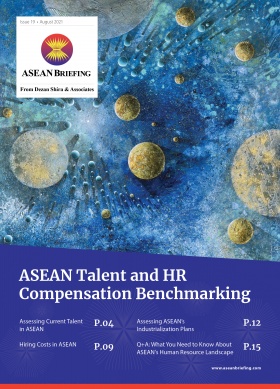Cambodia Ratifies Free Trade Agreement with China
On September 9, 2021, the National Assembly of Cambodia ratified the bilateral free trade agreement (FTA) with China, which aims to increase the trade of goods by reducing and eliminating tariffs and non-tariff barriers.
The Cambodia-China FTA extends across a wide range of sectors, including trade, tourism, investment, transportation, and agriculture. China will provide duty-free status to some 98 percent of imports from Cambodia whereas Cambodia has agreed to exemptions of up to 90 percent of its imports from China.
Although the vast majority of Cambodia’s exports to China are tariff-free through the ASEAN-China Free Trade Area (ACFTA), the CCFTA extends tariff-free trade to over 340 products, such as seafood products, garlic, cashew nuts, and dried chili, among others.Through the CCFTA, Cambodia hopes to increase bilateral trade with China to US$10 billion by 2023, up from US$8 billion in 2020. This is a timely development for Cambodia as businesses continue to reel from the European Union’s (EU) withdrawal of the Everything but Arms (EBA) status in 2020. The EBA status was withdrawn because of what the EU perceived as serious and systemic violations of human rights in Cambodia. The EBA provides 49 of the world’s poorest countries duty-free access to EU markets.
CCFTA can boost agricultural products trade with China
Through the CCFTA, Cambodia can leverage and better develop its agriculture industry in return for Chinese efficiency in manufacturing or products, such as electronic devices that local producers cannot make.
Between January to May 2021, Cambodian exports to China were valued at US$558 million, an increase of 56 percent from the same period in 2020. This increase was attributed to the rising demand for Cambodian agricultural products in China.
Beijing has been Cambodia’s top source for development aid since 2010, pouring some US$US$5.8 billion as of 2018. Through this, China has financed major irrigation projects, rice mills, and agricultural schools. Further, a list of 100 China-funded projects over the past 20 years shows 17 percent were agricultural-related.
Cambodia also saw a surge of 200 percent in the export of fruit in the first five months of 2021 and such exports can also help Cambodia gradually chip away the large trade deficit the country has with China; of the US$8 billion in bilateral trade in 2020, only US$1 billion was sent from Cambodia.
The export of fresh Cambodian mango was made possible because both countries were able to finalize sanitary requirements for fresh fruit in June 2020. The arrangement allows Chinese regulators to certify that specific Cambodian packing factories and orchards meet quality standards. This was previously not the case and Cambodian exporters had to ship their produce to Vietnam before entering China.
Cambodian bananas received similar approval in 2018, and exports for this fruit rose to US$121 million from US$8 million in 2019.
However, Cambodia’s agriculture sector is highly fragmented and is dominated by smallholders. As such, the government needs to develop policies to support small and medium farmers to create efficiency in the sector. Moreover, quality standard compliance poses one of the biggest challenges for boosting agricultural exports. In addition, Cambodia needs better infrastructure and investments in the downstream segments, such as processing facilities.
Pegging tourism resurgence in China
Cambodia’s tourism industry is a key contributor to economic growth (21 percent of GDP in 2019) and there is large potential to develop the eco-tourism sub-sector.
By 2020, Cambodia saw 1.31 million foreign visitors, a decline of 80 percent from 2019. Despite the downturn, Cambodia is pegging the resurgence of this sector on Chinese tourists.In 2015, the government launched the ‘China Ready for Cambodia Tourism’ policy to attract more Chinese tourists. The policy saw two million Chinese tourists visiting the country in 2019, although this dropped to 329,000 due to the pandemic.
Extended government support
Suspended workers in hotels, guesthouses, travel agencies and the tourism industries are also eligible for financial aid of US$40 until the end of September 2021. Moreover, registered guesthouses, hotels, restaurants, and travel agents that operate in Phnom Penh, Siem Reap, Preah Sihanouk, Kep, Kampot, Bavet, and Poi Pet continued to receive monthly tax exemptions from July to September 2021.
CCFTA will not cover loss occurred from EBA status
From the initial estimates of the CCFTA, the trade pact will add US$325 million or less than two percent of total GDP to Cambodia’s economy, whereas the withdrawal of Cambodia’s EBA status will impact one-fifth of the country’s exports to the EU, totaling US$1.1 billion.
The sectors most impacted are in textile, garment, and footwear manufacturing, which account for 80 percent of Cambodia’s total exports — agriculture only accounts for 5.4 percent of exports.
By comparison, Cambodia enjoyed a trade surplus with the EU and US, and the relationships brought in foreign exchange to the country. Any renewed EU tariffs could cost the economy an additional US$130 million each year, although the compound cost from the loss of investments could be greater.
Also, boosting agricultural exports is not a large progressive step for a country looking to move its export base from low-skilled and low-cost manufacturing to high-end manufacturing, and the percentage of Cambodians employed in the agriculture sector fell from around 75 percent in 1991 to 30 percent in 2018.
About Us
ASEAN Briefing is produced by Dezan Shira & Associates. The firm assists foreign investors throughout Asia and maintains offices throughout ASEAN, including in Singapore, Hanoi, Ho Chi Minh City, and Da Nang in Vietnam, Munich, and Esen in Germany, Boston, and Salt Lake City in the United States, Milan, Conegliano, and Udine in Italy, in addition to Jakarta, and Batam in Indonesia. We also have partner firms in Malaysia, Bangladesh, the Philippines, and Thailand as well as our practices in China and India. Please contact us at asia@dezshira.com or visit our website at www.dezshira.com.
- Previous Article Indonesia’s Omnibus Law: New Tax Treatment to Support Ease of Doing Business
- Next Article Bangladesh as a Gateway Between ASEAN and SAARC







